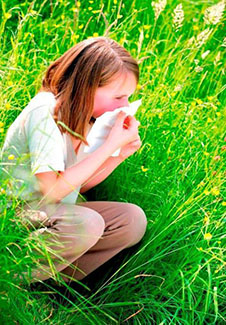Pollen and food allergy
 Allergic rhinitis – also known as hay fever – is an allergic reaction to pollen. Its common symptoms include sneezing, runny and sometimes blocked nose, itchy and red eyes, and feeling of tiredness.
Allergic rhinitis – also known as hay fever – is an allergic reaction to pollen. Its common symptoms include sneezing, runny and sometimes blocked nose, itchy and red eyes, and feeling of tiredness.
The symptoms appear during pollen season, when the pollen you are allergic to is at its highest level in the air. However, the symptoms can also be triggered by the pollen present in some products you consume or use as a medicine.
These products include: honey, camomile tea and herbal remedies deriving from bees like propolis, royal jelly or beeswax.
Oral allergy syndrome
Some people with pollen allergy may experience allergic symptoms after eating raw fruits, vegetables and some tree nuts. This is caused by cross-reacting allergenic proteins present in both pollen and these foods.
The immune system of people with oral allergy syndrome recognises and reacts to pollen and similar proteins found in the food.
Oral food allergy typically develops in older children, teenagers and young adults who have been eating the foods without any reactions.
Not everyone with pollen allergy will develop oral allergy syndrome.
Cross-reacting foods by pollen type
Those with oral allergy syndrome usually have an allergy to grass, birch or ragweed pollens.
Birch pollen
- Apple
- Almond
- Carrot
- Celery
- Cherry
- Hazelnut
- KiwiPeach
- Pear
- Plum
Grass pollen
- Celery
- Melon
- Orange
- Peach
- Tomato
Ragweed pollen
- Banana
- Cucumber
- Melon
- Sunflower seeds
- Courgette/zucchini
Symptoms of oral allergy syndrome
The most common symptoms include itchiness or swelling of the mouth, lip, face, tongue and throat. They appear immediately after consuming raw fruits or vegetables or a tree nut.
Oral allergy syndrome is perceived a mild form of food allergy and seldom leads to more severe reactions such as throat swelling and consequently difficulty breathing. Anaphylaxis is very uncommon.
The syndrome can occur at any time of the year; however, its symptoms worsen during pollen season of the pollen in question.
Management of symptoms
- Avoid eating raw foods (those associated with the pollen you are allergic to), especially during the pollen season.
- Cook the food, since high temperature breaks down the proteins responsible for the symptoms.
- Peel the food, as the culprit protein is usually located in the skin.
- When travelling, restrict yourself to small pieces of fruits and vegetables your body is not familiar with (exotic fruits and vegetables).
Cooking as a way of reducing allergenicity
Cooking vegetables and fruits will reduce their allergenicity, as high temperature leads to deformation of the allergenic proteins making them unrecognisable to the immune system.
Pollen calendar
Plant pollen concentration in the air changes throughout the year. To help allergy sufferers, pollen calendars have been developed to reliably indicate the levels of pollens of individual plants.
The severity and exact timing of the pollen seasons will vary from year to year and also from country to country as they depend on the weather, climate and biological factors.
See more information on pollen counts in the following areas:
Further reading
- Popescu, F. (2015) Cross-reactivity between aeroallergens and food allergens
- Chapman, J.A. et al. (2014) Food allergy: a practice parameter
